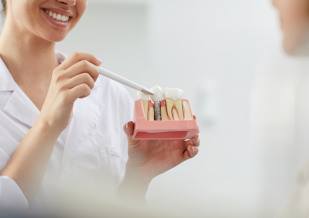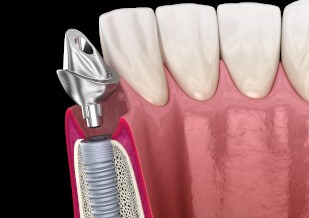Dental Implants – Virginia Beach, VA
Lifelong & Lifelike Tooth Replacements
If you have one or more teeth you need to replace, we can help you achieve great results with dental implants. As one of the most versatile restorative services currently available, dental implants can be used to support a single crown, a bridge, a partial, or a full denture. As a result, a growing number of patients are choosing dental implants over more traditional restorative services, creating smiles that look and feel natural. Don’t let missing teeth have a negative effect on your oral health and self-confidence. Let Dr. Asra Javeed and the experienced staff at Smile Care Family Dentistry talk to you about treatment with dental implants in Virginia Beach, VA.
Why Choose Smile Care Family Dentistry
for Dental Implants?
- Partnered with the Best Dental Implant Specialists in Virginia Beach
- Fair Prices with Zero Hidden Fees
- Certified Clinical Excellence in Tooth Replacement by Implant Pathways
What are Dental Implants?

A dental implant doesn’t exactly look like what you’d think of when you picture a replacement tooth. That’s because a dental implant is an artificial tooth root that recreates the part of the tooth hidden beneath the gumline. After the implant (made of biocompatible materials like titanium) is surgically placed in the jaw, it fuses to the bone tissue. This allows dental implants to support any number of replacement teeth with a foundation that is stable and long-lasting.
The 4-Step Dental Implant Process

Dental implants have a more complex treatment process than dentures or dental bridges. Getting them involves many steps, so it can take months before everything wraps up. The good news is that implants’ perks make this wait worthwhile! Since we use local specialists, the final posts will be well-placed and work well with your smile. The treatment is also consistent, though it can differ a bit from person to person. There are four steps to expect: consultation, surgery, osseointegration, and delivery of final restoration.
Initial Dental Implant Consultation

Before the actual dental implant surgery, you’ll meet Dr. Javeed for a consultation. This visit lets you share your treatment goals, and it allows us to learn your medical history and oral health. We’ll also use its findings to see if implants suit you, adjusting your treatment plan as needed.
All that said, you shouldn’t worry if you don’t qualify for dental implants at first. You can become a good candidate later through extra dental work, like gum disease therapy or tooth extraction. Such procedures would strengthen your mouth to handle implant posts.
Dental Implant Surgery

We’ll refer you to local specialists for dental implant surgery once you’re ready. These surgeons are very skilled and experienced, so you can trust them to do an excellent job. They’ll ensure your implant posts are placed precisely and work correctly for many years.
The surgery itself will involve things like the following:
- A Numbing Agent – Before surgery, the specialists will numb your treatment site(s) with anesthesia. This medicine will keep you from feeling pain during treatment; you’ll only feel slight pressure.
- Minor Incision Work – The specialists will make an incision in your gums once the anesthesia “kicks in.” That way, your mouth will have space for your future dental implant.
- Implant Placement – Using advanced methods and tools, the specialists will place your dental implant smoothly and precisely.
- Gum Closure – The specialists will close your gum incision when the placement is finished. They’ll then set a cap over your new implant.
Dental Implant Osseointegration & Abutment

After surgery, your dental implant will slowly fuse with your jaw. This process – known as osseointegration – takes 4-6 months and secures the implant posts. Once it’s finished, your new teeth will be permanent parts of your mouth and remain stable.
We’ll perform a follow-up surgery once you’ve healed from the fusion process. In particular, we’ll place an abutment (i.e., a metal connector) on your dental implant. This part will secure your final restoration and hold it in place.
Delivery of Dental Implant Restoration(s)

For the final part of your dental implant treatment, we’ll set your final restoration. That means we’ll place a prosthetic that “matches up” with how many teeth you lost. Based on the total number, the restoration could be a dental crown, dental bridge, or implant denture.
It won’t take long to fit your restoration; we’ll only have to apply some dental cement. Our team will then make last-minute changes to ensure quality results. When that’s over, you can enjoy your full grin!
Benefits of Dental Implants

With over half a million placed every year, dental implants are quickly becoming one of the most popular tooth replacement options, and it’s easy to see why. Since these titanium posts are placed directly in the jawbone, they can work and feel just like real teeth, and the attached ceramic dental crown creates an incredibly lifelike appearance. Here’s a brief guide to the ways dental implants from Smile Care Family Dentistry can improve your quality of life, health, and confidence in ways that traditional restorations like dentures and dental bridges cannot.
Day-to-Day Benefits

Dental implants can significantly enhance the pleasure and productivity of everyday life in ways such as:
- Restoring much more chewing ability than traditional restorations like dentures or dental bridges, allowing the patient to enjoy all sorts of foods like chewy steaks, crunchy nuts, and snappy raw veggies.
- Requiring only the same oral hygiene regimen as real teeth, meaning that the patient will not have to invest in any special cleaning tools or adhere to any elaborate maintenance rituals.
- Giving the patient the confidence they need to smile brightly at friends, coworkers, and strangers, which conveys competence, friendliness, trustworthiness, and approachability.
- Providing the replacement teeth with a sturdy hold so that they never slip out of place during chewing or speech.
Health Benefits

Dental implants also offer several amazing health benefits that can help you live more happily and comfortably. These include:
- Allowing the patient to chew a wider variety of foods, allowing them to enjoy a diverse diet that provides all the nutrition their body needs to stay healthy.
- Keeping the jaw stimulated to prevent or reverse bone loss. This can keep the remaining natural teeth from shifting out of alignment and becoming more likely to be injured or infected.
- Staying in place so they don’t cause soft tissue irritation or gum sores like dentures or dental bridges can if they don’t fit properly.
- Being easy to clean so the patient can prevent oral infections like tooth decay or gum disease.
Long-Term Benefits

With proper care, dental implants can be a long-term investment that offers significant returns. A few ways your dental implants can pay off in the long run include:
- Boasting a 95% success rate even ten years after placement.
- Potentially lasting for thirty years or more if they receive excellent care.
- Not needing frequent replacements like dentures or dental bridges do, which can potentially save a patient thousands of dollars over the years.
- Giving the patient the confidence they need to smile brightly and make an excellent first impression, which can confer a significant advantage when interviewing for a job or being considered for a promotion at work.
Who Dental Implants Can Help

We use dental implants to replace any pattern of tooth loss—from one tooth to an entire smile. The type of restoration that you need will depend on the number of teeth that you’re missing:
Missing One Tooth

For those missing a single tooth, we can use an implant-retained crown to restore your smile. We will match your dental crown to the rest of your teeth, giving you a seamless and beautiful replacement.
Missing Multiple Teeth

If you’re missing multiple teeth consecutively, we may recommend an implant-retained bridge. This treatment utilizes one dental implant on either side of the gap in your smile to support a dental bridge. The custom-made prosthetic literally bridges the gap in your teeth for a strong and healthy grin.
Missing All of Your Teeth

If you’re missing all or most of your teeth, we can combine dental implants with dentures to provide you with the most stable full smile replacement available. Using an average of four to six dental implants, we can mount a lifelike denture to restore your eating, speaking, and smiling.
All-on-4 Dental Implants

With All-on-4 implants, you can often receive a full denture on the same day that your implants are placed. This way, you never have to go without your teeth! All-on-4 uses only four implants that are placed at strategic angles and locations to make the most of the existing jawbone mass. Therefore, even patients who have experienced jawbone loss may be candidates for All-on-4.
Understanding the Cost of Dental Implants

If you’ve already done some research on dental implants, you may be aware that the cost of the procedure can vary significantly from case to case. The good news is that our team will be able to give you a trustworthy estimate of the overall price of the treatment at your initial consultation. Rest assured that you won’t have to move forward with the process without first having the chance to figure out a plan for making the process as budget-friendly as possible.
Preliminary Treatments & Dental Implant Surgery

Naturally, the surgery to place the implant posts in your mouth is one of the key contributors to the total cost of the dental implant process. Factors such as where the implants need to be inserted can affect the price of the surgery.
However, you shouldn’t overlook the costs associated with any preliminary procedures that you may need to have performed in order to be considered a candidate for dental implants. After examining your mouth, our team will be able to help you figure out whether you’ll need to pay for gum disease therapy, bone grafting, or other additional treatments.
The Parts of Your Dental Implant

How much will the dental implants themselves cost? The answer depends on the following:
- The Number of Implants Needed: A patient who has lost multiple teeth will likely need to pay for more dental implants than someone who is only missing one tooth.
- The Kind of Tooth Replacement Used: Crowns, bridges, and dentures can all be attached to dental implants. Each form of tooth replacement carries a different cost.
- The Material Used: Our team can explain what materials your dental implants will be made out of. The material used definitely matters when it comes to determining the final price.
How Dental Implants Can Save You Money

When looking at price alone, dental implants are generally more costly than traditional bridges and dentures. But the price tag isn’t the whole story; thanks to certain factors, there’s a good chance that getting dental implants could actually end up helping you save money.
One thing to consider is that dental implants tend to offer better longevity compared to other options. Traditional dentures and bridges may have to be replaced after just 5 to 10 years, but a dental implant could very well last for the rest of your life.
Another thing to think about is that dental implants can be given the same care as your natural teeth. This makes it very easy to maintain excellent oral hygiene so that you can avoid dental issues that you would need to pay to have treated.
Does My Dental Insurance Cover Dental Implants?

You should take a look at your dental insurance plan to make sure you’re aware of what benefits are available and how they can be used to help pay for your dental implants. Even if the implants themselves may not necessarily be covered, your plan could still help you manage the cost of your final restoration or certain preliminary treatments.
Making Dental Implants Affordable

Uninsured patients may want to think about applying for a CareCredit financing plan. The cost of dental implants can seem a lot less intimidating when you’re able to break it up into smaller monthly payments thanks to CareCredit. Get in touch with our team if you would like more information about CareCredit and how it works.
Maintaining & Caring for Your Dental Implants

Dental implants are custom-made for each patient, crafted from the highest quality materials, and inserted directly into your jawbone, which are a few of the many reasons they can last for three decades or more. If you don’t take good care of them, however, then it will only be a matter of time until they become loose or fall out completely. That’s why it’s so important to make good habits a priority, including:
Brush and Floss Consistently

Even if you only have one natural tooth left, you need to brush and floss consistently. This is crucial for a few reasons, starting with the fact that peri-implantitis (a form of gum disease) is one of the leading causes of dental implant failure. A solid oral hygiene regimen will also ensure your smile looks great, there isn’t a white cast on your tongue, and your breath stays minty-fresh. So, make sure that you brush twice a day, floss daily, and rinse with mouthwash consistently!
Eat a Healthy Diet

Eating a well-balanced diet is also important when it comes to maintaining a healthy, happy smile. After all, your body needs the proper vitamins, nutrients, and minerals in order to keep your gums infection-free and your jawbone strong! Plus, consuming sugary and starchy foods in excess increases your risk of oral health problems, and crunchy, hard, and sticky ones increase your risk of dental damage. That’s why it’s important to opt for smile-friendly options, like plain yogurt!
Break Bad Habits

When people think of bad dental habits, they often think of smoking. That’s certainly one you should break ASAP, but there are others that can wreak havoc on your teeth, gums, and dental implants. So, if you bite your nails when you’re nervous, consider squeezing a stress ball instead. If you use your teeth to remove plastic wrapping, use scissors instead. If you chew in ice cubes when it’s hot, sip on cool water instead.
Protect Your Dental Implants

The previously mentioned tips, like squeezing a stress ball instead of biting your nails, will go a long way when it comes to preserving your dental implants. For the same reason, we recommend wearing a nightguard if you grind or clench your teeth at night. You should also wear a mouthguard if you play sports, even if it’s a non-contact one. That way, your risk of soft tissue injuries, a crack in your dental implant, and other serious dental emergencies is significantly less.
Schedule Regular Dental Checkups

Last, but most certainly not least, you need to visit Dr. Asra Javeed every six months for a dental checkup and teeth cleaning. These routine appointments are crucial because they allow us to examine the condition of your dental implants, conduct an oral cancer screening, make sure your gums are healthy, and answer any questions you have about your oral health.
Dental Implant FAQs

At this point, maybe you're interested in dental implants. You could certainly trust them – they’d do a great job restoring and beautifying your smile! However, you likely still have some lingering concerns. (It’s best to go into treatment informed, after all.) We at Smile Care Family Dentistry can help: listed below are some popular implant questions and their answers. By reading them over, you’ll understand how the prosthetics work. If you need other details, though, please call our office!
How Successful Are Dental Implants?
Rest assured: dental implants are highly successful. When placed by a skilled professional, their success rate even exceeds 95%! That means well-placed implants hardly ever fail early.
Of course, an implant’s success still requires that you maintain it. You must thus practice good oral hygiene, attend dental checkups, and eat a healthy diet. Otherwise, you might develop dental issues that put your prosthetic at risk. You’d then be forced to get a replacement from your dental provider.
All that said, treatment success will also depend on your implant’s location. For example, one acting as a molar will receive more pressure than a front tooth. It’d then be more likely to fail.
Are Dental Implants Safe?
So long as a dental professional places them, implants are quite safe. They won’t harm your mouth or the rest of your body.
Still, certain medical conditions can make placement risky. If you suffer from low jawbone density or gum disease, the odds of your treatment’s success will decrease. Patients with diabetes and cancer could also suffer complications after surgery.
Given these realities, let your dentist review your medical history before treatment. They can then tailor the implant surgery to account for your background. From there, the procedure should proceed smoothly and successfully.
What Can Cause Dental Implants to Fail?
While rare, dental implant failure can happen sometimes. These incidents usually occur for one of two reasons: peri-implantitis or failed osseointegration.
Put simply, peri-implantitis is a type of gum disease. It’s typically caused by poor oral hygiene and damages your gums and jaw. Due to these effects, the infection can cause an implant to lose its support and fall out.
Failed osseointegration (per its name) occurs when an implant doesn’t fuse with the jawbone. It often occurs when the patient has already suffered from low jawbone density. The failed fusion results in the implant staying loose and unstable. From there, it must be removed and replaced.
Will I Have to Take Off Work for Dental Implant Surgery?
Implant surgery will require that you take time away from work. However, this period usually isn’t long. Most patients only need a day or two off to get implants.
Even so, keep in mind that every case is different. A dentist may suggest more time off if your situation is unique. For example, those with physically demanding jobs should take three or four days off. Heavy exercise could divert blood from the implant site and delay healing. (To compensate, you could schedule your procedure on a Thursday or Friday.)

